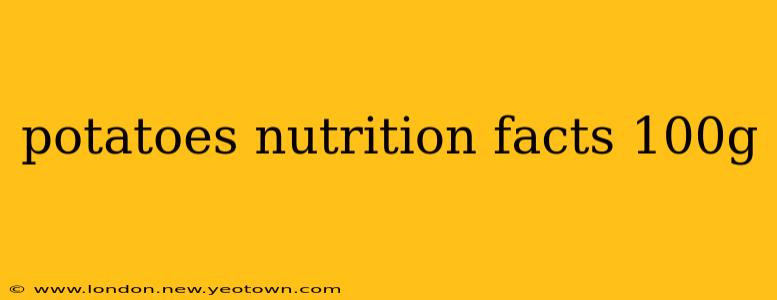The humble potato. Often overlooked, this starchy tuber is a nutritional powerhouse, packed with vitamins, minerals, and fiber. But just how much goodness is hiding in a typical 100g serving? Let's delve into the fascinating world of potato nutrition and uncover the surprising benefits this versatile vegetable offers.
Our journey starts with a simple 100g serving of a medium-sized potato (approximately one). Keep in mind that nutritional content can vary slightly depending on the type of potato (russet, red, sweet, etc.), growing conditions, and cooking methods. However, the general nutritional profile remains remarkably consistent.
What's in a 100g Serving of Potato?
A 100g serving of a baked potato (without added butter or toppings) typically contains approximately:
- Calories: 77-90 calories
- Carbohydrates: 17-20g (mostly starch, a complex carbohydrate)
- Protein: 2g
- Fat: 0.1g
- Fiber: 2g
- Potassium: A significant amount, contributing to healthy blood pressure.
- Vitamin C: A good source of this crucial antioxidant.
- Vitamin B6: Important for brain development and function.
- Iron: Though in smaller quantities, still contributes to overall iron intake.
Are Potatoes Fattening?
This is a common question, and the answer is nuanced. While potatoes are relatively high in carbohydrates, they aren't inherently "fattening." The key lies in how they're prepared. Loading a baked potato with butter, sour cream, cheese, and bacon dramatically increases its calorie and fat content. However, a simply prepared baked or boiled potato provides substantial nutrients without excessive calories.
What are the best ways to prepare potatoes to minimize calories and maximize nutrients?
Boiling, baking, and steaming potatoes retain the most nutrients and keep the calorie count relatively low. Frying, however, adds significant fat and calories, diminishing the nutritional benefits. Choosing healthy cooking methods is crucial for reaping the potato's nutritional rewards.
Are Potatoes Good for Weight Loss?
Potatoes, prepared in a healthy way, can be part of a balanced diet for weight loss. Their fiber content promotes satiety, helping you feel full for longer, which can aid in weight management. However, moderation is key. Overconsumption of any food, even healthy ones, can hinder weight loss efforts.
How can potatoes be included in a weight-loss diet?
Incorporate potatoes as part of a balanced meal plan, focusing on healthy cooking methods and portion control. Pair them with lean proteins and plenty of vegetables to create a satisfying and nutritious meal.
Are Potatoes a Good Source of Fiber?
Yes, potatoes offer a decent amount of dietary fiber, particularly in the skin. Fiber is crucial for digestive health, regulating bowel movements, and promoting feelings of fullness. Leaving the skin on your potato significantly boosts its fiber content.
What are the benefits of fiber in potatoes?
Fiber contributes to digestive regularity, aids in lowering cholesterol levels, and helps regulate blood sugar levels. It also plays a vital role in maintaining a healthy gut microbiome.
Are Potatoes Gluten-Free?
Yes, potatoes are naturally gluten-free. This makes them a suitable option for individuals with celiac disease or gluten sensitivity. However, always check labels if consuming processed potato products, as they may contain added gluten-containing ingredients.
In conclusion, the potato, when prepared thoughtfully, is a versatile and nutritious food. Understanding its nutritional profile and choosing healthy preparation methods empowers you to enjoy this readily available and affordable source of essential vitamins, minerals, and fiber. Remember, moderation and mindful eating habits are key to maximizing the benefits of any food, including the humble potato.

